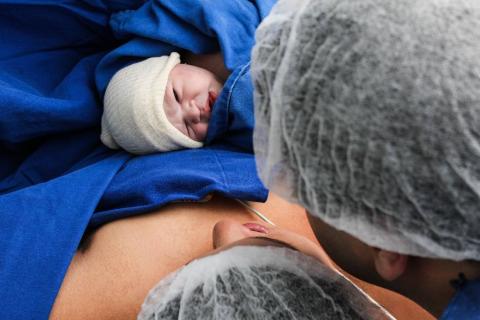Study looks at men's problems with fatherhood due to lack of information and emotional support
Men often struggle with the transition to fatherhood due to a lack of information and emotional support targeted to their needs, suggests a review of the available qualitative evidence, published in the open access journal BMJ Open. The researchers say there needs to be a greater focus on clinical practice, antenatal services and research into men's unique experiences during the perinatal period, which encompasses pregnancy and the first 12 months after birth.

María José González - pobres padres EN
María José González
Associate Professor and researcher in the Sociodemography research group (DemoSoc) of the Department of Political and Social Sciences and the Centre for Gender Studies (CdGE) of the UPF
This article examines the experience of fatherhood from the perspective of fathers, a topic that, according to the authors, has been largely neglected in research. Specifically, it examines the transition to fatherhood and its impact on fathers' mental health and emotional and social well-being, as well as their perception of accompaniment in the perinatal period. Importantly, the study does not use primary data, but is a meta-analysis based on the findings of 37 academic articles, from which it synthesises the main conclusions. This implies that the article is not based on a statistically representative sample of fathers, but collects some of the narratives expressed by male interviewees, which are not representative of fathers as a whole in their respective countries. The authors point out that in the studies analysed, the profile of the British male, white, highly educated and over 25 years of age, predominates.
In my opinion, this study does not allow generalisations such as ‘men tend to have difficulties in the transition to fatherhood’ because they do not have a representative sample of fathers and the fathers analysed correspond to biased samples. However, interesting narratives emerge from this study, such as the recurrent complaint of fathers about feeling excluded from childbirth classes and support for pregnant women. However, the results of this meta-study, which highlight fathers' distress in the first year and their difficulties in bonding, need to be understood in a broader context, such as the significant gender differences in the parental leave system. In the case of the UK, for example, working mothers are entitled to 52 weeks of maternity leave, while fathers have only one or two weeks of paternity leave. The system thus establishes a social norm whereby the mother becomes the primary caregiver in early childhood. The study also fails to provide a contextual analysis of structural gender inequalities in the labour market, which would facilitate a deeper understanding of the distance created in couples by the arrival of children.
Octavio Salazar - pobres padres EN
Octavio Salazar
Professor of Constitutional Law at the University of Cordoba and member of the Committee of Experts of the European Institute for Gender Equality
The study on the difficulties that men go through in the process of becoming fathers puts us on the trail of an unprecedented terrain in the field of social research and in the debates related to the construction of masculinity. As it is an experience and a responsibility not traditionally assumed, it is normal that it is only very recently that research has been initiated, from very different fields, on our role as present fathers and, in turn, our duties in the practical realisation of what we have legally agreed to call co-responsibility. The work is a good example of how in recent years the so-called ‘men's studies’ have been expanding and how an interdisciplinary approach is essential.
The study provides us with interesting data to raise some initial questions and, in addition to its comparative perspective, it has the merit of shedding light on issues related to mental health or well-being and, therefore, of pointing out threads that should be the object of reflection and debate not only in the academic sphere but also in the social and political spheres. Hopefully without falling into the obvious risk of once again making the men, now fathers present, the heroes of the story.
Teresa Jurado - pobres padres EN
Teresa Jurado Guerrero
Professor of Sociology, expert in youth, family and gender, head of the Centre for Comparative Social Structures at the National University of Distance Education (UNED)
The review of 37 studies using qualitative methodology is highly systematic, includes a peer review with inclusion of a group of the public and stakeholders, namely parents, and follows the quality indices of a prestigious medical and public health research institute. The review process is very well detailed and supported by qualitative data through citations and background information from the parents who form the units of analysis of the reviewed studies.
The existing evidence is mainly Anglo-Saxon and comes from the fields of medicine, psychology and public health. The authors are also part of this area of expertise, but include in the review any studies on the topic of men's health and well-being as they transition to fatherhood, including literature from sociology.
The authors have taken into account all kinds of factors because this is a review of qualitative and non-statistical studies, so the aim is to find the themes that emerge from the discourses of fathers interviewed using different research techniques. Some of the limitations of the study are listed by them: most of the parents come from Western contexts, from heterosexual families and some studies do not meet all desirable quality standards. Moreover, the authors do not make their theoretical-normative position explicit and forget the public policy context, such as the question of whether or not fathers had access to longer or shorter parental leave and whether they cared alone or only in the mother's company.
This study is very relevant because it focuses on the emotional health of some fathers due to the degradation of their relationship with their partner, the feeling of being excluded from care, the confusion of social expectations towards them, their exclusion in various areas of perinatal health and the lack of validation by their peers. As a consequence, some fathers report the emergence of tensions with family members and the mother.
The emotional health of fathers is very relevant not only for their well-being, but also for fostering the development of a family climate that allows for the secure attachment of the baby to the mother and father in contexts that pursue equal opportunities between women and men. The sense of exclusion from childbirth preparation and postnatal training or information is very revealing. Experiences of including fathers in childbirth preparation courses in Spain should be replicated on a large scale. In addition, current legislation should guarantee the possibility for fathers to use childbirth and childcare leave autonomously and in turn with the mother in order to enable the creation of a secure attachment with their child.
Watkins et al.
- Research article
- Review
- Peer reviewed
- People



